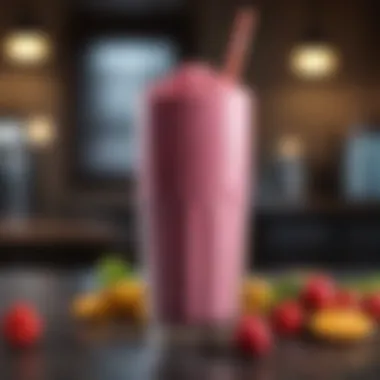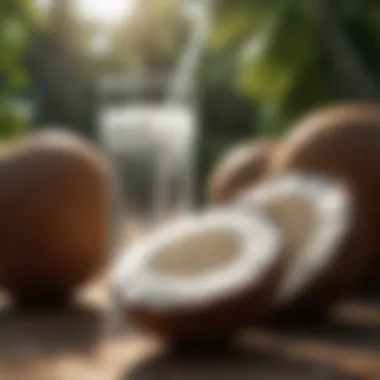Smart Choices Before Drinking to Prevent Hangovers


Intro
Social drinking is often synonymous with celebrations, relaxation, and social bonding. However, the after-effects of these indulgences, specifically hangovers, can dampen the enjoyment. Understanding how to mitigate these effects starts with considering what we consume before alcohol.
Hydration plays a crucial role in reducing hangover symptoms. Alcohol is a diuretic, which means it increases urine production and can lead to dehydration. Therefore, selecting the right beverages prior to drinking can aid in enhancing hydration levels and maintaining electrolyte balance, crucial components for overall well-being during social events.
In this guide, we will explore scientifically backed drinks that may help to alleviate the risk of experiencing hangover discomfort. Understanding the physiological mechanisms behind hangovers, alongside the roles of specific nutrients, can empower individuals to navigate their social drinking experiences more responsibly.
Prelude to Hangovers
The phenomenon of a hangover is a significant point of concern for many individuals who partake in social drinking. Understanding hangovers is crucial not just for those looking to enjoy alcohol responsibly but also for health professionals working to promote well-being. By delving into the nature of hangovers, we can better appreciate how to prevent them through various beverages and hydration strategies.
Defining a Hangover
A hangover is a set of undesirable symptoms that occur after the consumption of alcohol. These symptoms commonly include headaches, nausea, fatigue, and dehydration. The severity of a hangover varies greatly among individuals, influenced by factors such as the type and quantity of alcohol consumed, personal tolerance levels, and even genetic predispositions.
Research indicates that hangovers are primarily due to the body’s reaction to alcohol, leading to inflammation and disruptions in electrolytes. This makes it essential to define what comprises a hangover, as understanding its characteristics is the first step toward effective prevention strategies.
Understanding Alcohol Metabolism
Alcohol metabolism refers to how the body processes and eliminates alcohol. When consumed, ethanol is absorbed into the bloodstream, where it is metabolized by the liver. The primary enzyme responsible for this process is alcohol dehydrogenase, which breaks down ethanol into acetaldehyde. This compound is then further converted into acetic acid, which is non-toxic.
Understanding this metabolic process sheds light on why hangovers occur. As acetaldehyde accumulates in the body, it can lead to toxic effects, causing symptoms associated with hangovers. Factors such as age, gender, and overall liver function can significantly influence individual metabolism rates, leading to varied experiences with alcohol consumption. Furthermore, the rate at which alcohol is processed can have a direct correlation with hangover severity.
A comprehensive grasp of hangovers not only aids in creating preventative measures but also fosters a healthier relationship with alcohol. Addressing hydration and nutrient deficiencies may help in mitigating the negative consequences associated with excessive drinking. It is therefore imperative for individuals to be informed about their choices before engaging in social drinking.
The Role of Hydration
Hydration plays a critical role in influencing how one experiences alcohol consumption. The body is comprised of approximately 60% water, and maintaining adequate hydration levels is essential for overall health. When alcohol is metabolized, it may lead to dehydration, resulting in the unpleasant symptoms associated with hangovers. Promoting hydration before drinking can help mitigate potential hangover effects and foster a more enjoyable drinking experience.
Importance of Fluid Intake
Fluid intake before drinking is vital in preparing the body to handle alcohol. When consuming alcoholic beverages, the body tends to lose fluids as alcohol acts as a diuretic, causing increased urination. This loss can be detrimental as it may lead to dehydration, heightened fatigue, and exacerbated headache symptoms. To counteract this, one should focus on pre-drinking hydration. The strategy can include drinking water or electrolyte-rich beverages in the hours leading up to alcohol consumption.
Hydrated individuals may experience fewer hangover symptoms such as excessive thirst, dry mouth, and general discomfort. Moreover, the body’s efficiency in processing alcohol improves with adequate fluid intake, as hydration can help maintain optimal blood volume and circulation. Therefore, starting the evening well-hydrated can be crucial in reducing the severity of hangovers.
Choosing Hydrating Beverages
Not all fluids contribute equally to hydration, and selecting the right beverages can help optimize hydration levels. Here are some effective options:
- Water: The most straightforward choice, water is essential for hydration. It is calorie-free and effective in replenishing lost fluids.
- Coconut Water: Rich in potassium and other electrolytes, coconut water serves as an excellent hydration source, making it a popular pre-drinking option.
- Herbal Teas: Non-caffeinated herbal teas, like chamomile or peppermint, can hydrate the body and provide soothing effects.
- Sports Drinks: These drinks contain added electrolytes and carbohydrates. However, it is essential to choose lower-sugar options to avoid excess calorie intake.
- Fruit Juices: 100% fruit juices, such as orange or apple juice, can offer hydration and essential vitamins. However, they should be consumed in moderation due to their sugar content.
Incorporating these beverages into your pre-drinking regimen can create a more advantageous hydration strategy and ultimately reduce the likelihood of hangover symptoms.
Electrolytes and Hangover Prevention
Electrolytes play a critical role in maintaining bodily functions, particularly during occasions of alcohol consumption. When drinking alcohol, the balance of electrolytes in the body can become disrupted due to increased urination and dehydration. This disruption can exacerbate hangover symptoms, making it essential to consider electrolyte intake before consuming alcoholic beverages.


Benefits of Electrolytes
Electrolytes such as sodium, potassium, calcium, and magnesium help regulate various bodily functions, including nerve function and muscle contraction. They also maintain fluid balance, which is particularly important when alcohol can act as a diuretic. Correcting electrolyte imbalances can mitigate the severity of hangovers and improve overall well-being.
When planning a night out, taking electrolytes can help prepare the body for the incoming alcohol load. This is not just about mitigating hangover effects but also promoting a smoother experience while drinking.
"A well-hydrated body with balanced electrolytes may withstand alcohol's dehydrating effects more effectively."
There are several considerations when it comes to electrolytes. While it is possible to simply consume salty snacks, which naturally contain sodium, achieving a balanced mix of electrolytes can be more beneficial. Supplements and beverages specifically designed to replenish electrolytes can also be effective choices.
Understanding Electrolytes
Electrolytes are minerals that carry an electric charge. They are vital in numerous bodily processes including muscle function and hydration. When alcohol is consumed, the body loses fluids and essential minerals which leads to a state of dehydration. In a dehydrated state, the functions that electrolytes support can be impaired, resulting in symptoms like headaches, fatigue, and nausea – all hallmark signs of a hangover.
Maintaining electrolyte levels can be achieved through both dietary sources and drinks. The timing of these intakes can also affect their efficiency. Ideally, electrolytes should be consumed before and during alcohol consumption to maintain balance.
Beverages Rich in Electrolytes
Certain drinks stand out for their rich electrolyte content and could serve as practical pre-drink beverages. Here are a few worth considering:
- Coconut Water: This natural drink contains potassium and sodium, making it an excellent choice to keep the body hydrated.
- Sports Drinks: Many popular sports drinks offer a balanced mix of electrolytes. They are formulated not just for hydration but also for rapid replenishment of lost minerals.
- Electrolyte-Enhanced Water: Many brands provide water enhanced with added electrolytes. These options are often lower in calories while still being effective at hydration.
- Vegetable Juices: Drinks like tomato juice offer not only vitamins but also a significant amount of sodium.
Incorporating these beverages prior to alcohol consumption can help a drinker prepare their body to handle the effects of alcohol more effectively. The goal is to ensure that the body's electrolyte levels are adequately supported, which can lead to a more enjoyable and less discomforting experience afterwards.
Specific Drinks to Consider
In the context of preventing hangovers, the choice of drink before engaging in alcohol consumption can significantly influence the subsequent experience. This section considers specific beverages, each with attributes that may contribute to hydration and electrolyte replenishment. Understanding these drinks helps delineate their roles in mitigating hangover effects and provides a practical guide for pre-drinking strategies.
Coconut Water
Coconut water has gained recognition as an effective hydrating beverage. It is low in calories and contains essential electrolytes like potassium, magnesium, and sodium. These nutrients are crucial for maintaining hydration levels, particularly when alcohol consumption is anticipated. Alcohol acts as a diuretic, leading to increased fluid loss, thereby necessitating a proactive approach to hydration.
Coconut water is often touted for its natural composition and may appeal to those preferring organic options. Studies suggest it can help restore electrolyte balance, promoting better hydration than some sports drinks. When consumed before alcohol, coconut water can serve as an effective buffer against the dehydrating effects of ethanol.
Sports Drinks
Sports drinks like Gatorade or Powerade are formulated to replenish lost electrolytes and fluids. They are widely consumed during various athletic activities but can also be effective in preparation for alcohol consumption. These beverages contain a balance of carbohydrates, electrolytes, and water, making them suitable for hydration.
The quick absorption of electrolytes is a key benefit, especially when consumed prior to drinking alcohol. However, it is necessary to monitor the sugar content, as excessive sugar can counteract hydration efforts. Choosing lower-sugar options can enhance their effectiveness in hydration without excess caloric intake. Individuals should pay attention to the timing of consumption, ensuring they hydrate adequately before transitioning to alcoholic beverages.
Herbal Teas
Herbal teas, such as chamomile or ginger tea, may offer unique benefits when consumed before drinking. These teas can promote digestion and relaxation, potentially preventing stomach discomfort associated with alcohol intake. Furthermore, herbal teas are generally caffeine-free, reducing the risk of additional dehydration.
Certain types of herbal teas are known to have calming effects on the gastrointestinal system. Ginger tea, in particular, can help mitigate nausea, which is often a precursor to hangover symptoms. Before indulging in alcohol, sipping on herbal tea can not only ensure hydration but also prepare the body for the effects of alcohol.
Fruit Juices
Fruit juices can serve as both hydration sources and nutrient contributors. Drinks such as orange juice or pineapple juice are rich in vitamins and minerals, specifically vitamin C and potassium. These nutrients play an essential role in supporting the body’s overall health and recovery during alcohol consumption.


When considering fruit juices, opting for those without added sugars enhances their effectiveness. Pure fruit juices can substantially contribute to hydration levels and provide antioxidants that may combat oxidative stress induced by alcohol. However, moderation is key, as excessive consumption may lead to high sugar intake, negating hydration benefits.
In summary, the drinks explored in this section offer a variety of options that can promote hydration, electrolyte balance, and overall well-being prior to alcohol consumption. Integrating one or multiple of these beverages into your pre-drinking regimen can enhance your experience and potentially reduce hangover severity.
Nutritional Preparations
Nutritional preparations play a significant role in mitigating the effects of alcohol consumption and minimizing hangover symptoms. Proper nutritional strategies can enhance hydration and provide essential nutrients that support overall health. This section focuses on two key elements: supplements and whole foods. Each of these components can act as an effective buffer against the overconsumption of alcohol, allowing individuals to engage in social drinking while prioritizing their well-being.
Supplements to Consider
When it comes to hangover prevention, certain supplements possess the potential to help individuals prepare their bodies before indulging in alcohol. These include vitamins, minerals, and herbal extracts that can support liver function and hydration.
- B Vitamins: The B-complex group is crucial for energy metabolism and may mitigate some hangover symptoms. Thiamine, riboflavin, niacin, and B12 aid in breaking down alcohol and replenishing energy.
- Vitamin C: This antioxidant can help combat oxidative stress generated by alcohol consumption, thus helping to reduce cellular damage.
- Milk Thistle: Known for its liver-supportive properties, milk thistle may assist with detoxification processes, potentially easing the burden on the liver.
- N-acetylcysteine (NAC): NAC is a precursor to glutathione, an important antioxidant in the liver. Increased levels may help decrease hangover severity.
It is advisable to take these supplements prior to drinking for optimal effectiveness. However, one should always consult with healthcare professionals before starting a new supplement regime.
Whole Foods as Preventative Measures
In addition to supplements, incorporating certain whole foods into your pre-drinking routine offers a natural way to fend off hangover symptoms. Various foods contain nutrients that aid in hydration, liver function, and overall recovery.
- Bananas: They are high in potassium, which helps maintain electrolyte balance, especially after consuming alcohol.
- Eggs: Packed with cysteine, an amino acid that may help in breaking down acetaldehyde, a toxic byproduct of alcohol metabolism.
- Avocados: Rich in healthy fats and potassium, avocados can help replenish lost nutrients from alcohol consumption.
- Oats: Contain fiber, vitamins, and minerals, which can help stabilize blood sugar levels, an important factor when drinking.
- Spinach: This leafy green provides essential vitamins and minerals that can enhance liver functionality and support hydration.
Incorporating these foods into your diet before drinking provides natural defenses against hangovers.
"Prioritizing nutrient-rich foods and appropriate supplements can significantly influence how the body reacts to alcohol intake, ultimately reducing the likelihood of a hangover."
By understanding the role of nutritional preparations, individuals can make informed choices about their pre-drinking strategies. This knowledge empowers them to enjoy social events responsively while minimizing potential negative outcomes.
Timing Matters
The relationship between when you consume certain beverages and how effectively they can mitigate hangover symptoms is significant. Understanding timing is a key element in planning for social drinking. Preemptive hydration can influence how the body handles alcohol.
When you drink, your body dehydrates, and replenishing fluids before consuming alcohol helps to maintain hydration levels. Ideally, the chosen drinks should supply both fluids and electrolytes. Consuming these beverages well before the first alcoholic drink can establish a groundwork. The longer the timing before drinking, the more opportunity your body has to prepare.
When to Drink These Beverages
Timing is essential, but the precise moment can depend on personal preferences and social events. A good practice is to start hydrating several hours prior to alcohol consumption. For example, starting at least two to three hours before helps in maximizing fluid and electrolyte absorption.
Some might favor sipping hydrating drinks just an hour before beginning to drink alcohol. Others may find that intake of hydrating fluids alongside their first drink is effective. Therefore, it is critical to communicate with your body and recognize what works best for you. Each individual may have different hydration needs based on factors such as body weight, alcohol tolerance, and overall health.
Pre-Drinking Hydration Strategies
When considering strategies to hydrate before drinking, it can be beneficial to adopt a multi-pronged approach.
- Establish a Hydration Schedule: Plan your drinking patterns, including refreshing fluids at regular intervals.
- Choose the Right Beverages: As discussed elsewhere, prefer drinks rich in electrolytes, such as coconut water or specific sports drinks, because they can help in retaining fluids.
- Avoid High Sugar Drinks: While fruit juices may seem appealing, be cautious as high sugar content may counteract hydration efforts.
- Incorporate Foods: Eating light meals with high water content, such as cucumbers or watermelon, can also contribute to hydration.
- Monitor Your Condition: Pay attention to how hydrated you feel. Increased thirst can indicate that more fluids are needed.
Maintaining a deliberate focus on hydration helps your body cope better with alcohol and reduces the potential for a hangover. Being mindful of timing and hydration strategies can significantly improve your overall drinking experience.


Limitations and Considerations
The topic of limitations and considerations is crucial when discussing strategies to prevent hangovers. Many drinkers seek methods to minimize discomfort after consuming alcohol, yet various factors can influence the effectiveness of these strategies. Understanding these limitations helps set realistic expectations about what preventive measures can truly achieve.
Individual Differences
Individual differences play a substantial role in how a person's body responds to alcohol and hydration methods. Genetic factors, body composition, and even gender can affect how alcohol is metabolized. This means that a drink that helps one individual may not have the same effect on another.
For example, individuals with a higher percentage of body fat may metabolize alcohol differently than those with more muscle. Additionally, those who drink regularly may develop tolerance, which shifts their body's response to alcohol and hydration. These biological variances underline the importance of personalized approaches. Each drinker might need to discover what works best for them.
Scientific Limitations of Current Research
The scientific understanding of hangovers and their prevention is still developing. Current research can be limited by various factors, including sample size, diversity of participants, and methodologies used. Much of the available information on beverages to counter hangovers is based on anecdotal evidence rather than rigorous scientific studies.
As such, while some drinks, like coconut water or sports drinks, show promise in hydration and replenishing electrolytes, definitive conclusions about their effectiveness in preventing hangover symptoms require further investigation. Researchers continue to explore the relationship between hydration, nutrient intake, and hangover severity.
In summary, both individual differences and the existing scientific limitations should be acknowledged when evaluating the drinks to consume before drinking alcohol. Recognizing these elements allows for a more informed and nuanced understanding of hangover prevention strategies.
Realistic Expectations
Setting realistic expectations regarding beverage consumption before drinking alcohol is crucial for anyone looking to mitigate the risk of hangovers. While certain drinks can help improve hydration and electrolyte balance, it is essential to recognize their limitations. No beverage can completely prevent hangovers. Understanding what is achievable will help individuals make informed decisions and reduce disappointment after a night out. This section explores the efficacy of various pre-drinking strategies and considerations that should not be overlooked.
Understanding Efficacy
When evaluating the efficacy of drinks intended to prevent hangovers, one must distinguish between hydration and the mitigating effects on symptoms. Research highlights that optimal hydration can positively influence one’s overall experience while drinking. Beverages such as coconut water or electrolyte-rich sports drinks can maintain hydration levels and sodium balance. However, it is important to note that the reduction of hangover symptoms is not solely dependent on liquid intake. Factors such as individual tolerance, the quantity of alcohol consumed, and overall health also play significant roles.
Additionally, some studies suggest that specific vitamins and minerals can aid in reducing hangover symptoms. For example, vitamin B and C, found in various fruit juices, are known for their antioxidant properties. Nevertheless, the extent of their effectiveness varies among individuals. Therefore, while these beverages can play a supportive role, they should be viewed as one aspect of a broader strategy that includes moderation and responsible drinking practices.
Alcohol Consumption and Hydration Balance
The relationship between alcohol consumption and hydration balance is intricate and demands attention. Alcohol acts as a diuretic, increasing urine production and contributing to dehydration, which often leads to hangover symptoms. Thus, it becomes essential to maintain a balance. The consumption of hydrating drinks before and during alcohol intake can help counteract the dehydrating effects of alcohol.
Effective strategies include:
- Drinking Hydrating Beverages: Start with a glass of water or an electrolyte drink before alcohol consumption. Coconut water is an excellent option due to its natural electrolytes.
- Alternate Between Alcohol and Water: For every alcoholic beverage consumed, drink a glass of water. This method can help to maintain hydration and could ease the burden on the body.
- Monitor Your Alcohol Intake: Be mindful of the amount of alcohol being consumed. Limiting intake can significantly reduce the severity of potential hangover symptoms.
In summary, managing the hydration balance in conjunction with alcohol consumption is key. Keeping these expectations in mind allows individuals to enjoy social situations while minimizing the risk of unpleasant aftereffects.
End
In the context of preventing hangovers, the topic of what to drink before consuming alcohol holds significant relevance. This article has explored various beverages that can help mitigate the adverse effects of alcohol consumption. The main elements discussed encompass hydration, electrolyte balance, and nutritional support. Each of these elements plays a crucial role in minimizing hangover symptoms and promoting overall wellness during social drinking occasions.
Summary of Key Points
- Hydration is Essential: Maintaining proper fluid levels is critical for counteracting the dehydrating effects of alcohol. Drinking water, herbal teas, or electrolyte-rich beverages before and during alcohol consumption can aid in hydration.
- Electrolyte Balance: Electrolytes like sodium, potassium, and magnesium support cellular function and hydration. Beverages such as coconut water and sports drinks can help replenish lost electrolytes.
- Nutritional Considerations: Drinks fortified with vitamins or natural nutrients can enhance the body’s resilience against alcohol. Fruit juices and teas offer antioxidants and vital nutrients that may ease the recovery process.
- Timing and Strategy are Key: The timing of consuming these beverages, ideally before drinking alcohol, can have a profound impact on the body’s ability to cope.
Final Thoughts on Responsible Drinking
In summary, integrating the right beverages before drinking alcohol is a proactive approach to reducing hangover risk. While no method guarantees complete prevention, understanding these strategies allows for more enjoyable social experiences without severe consequences. It is important to recognize individual differences in alcohol tolerance and hangover susceptibility. Practicing responsible drinking and making informed choices will not only enhance one’s health but also contribute to overall social enjoyment.
"Being mindful of what to drink before engaging in alcohol consumption can be the difference between a pleasant evening and a day spent recovering from hangover symptoms."
Ultimately, navigating social settings while prioritizing hydration and nutrition fosters a balanced relationship with alcohol, encouraging a lifestyle that values health without sacrificing enjoyment.







